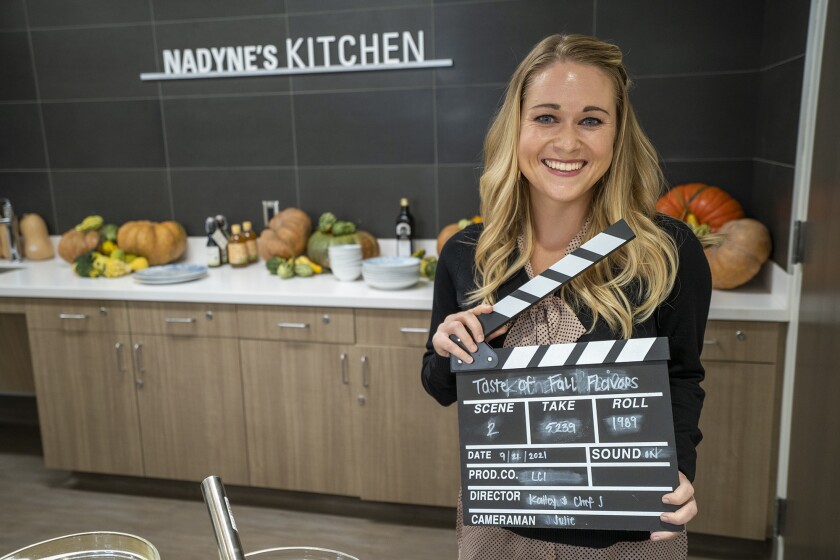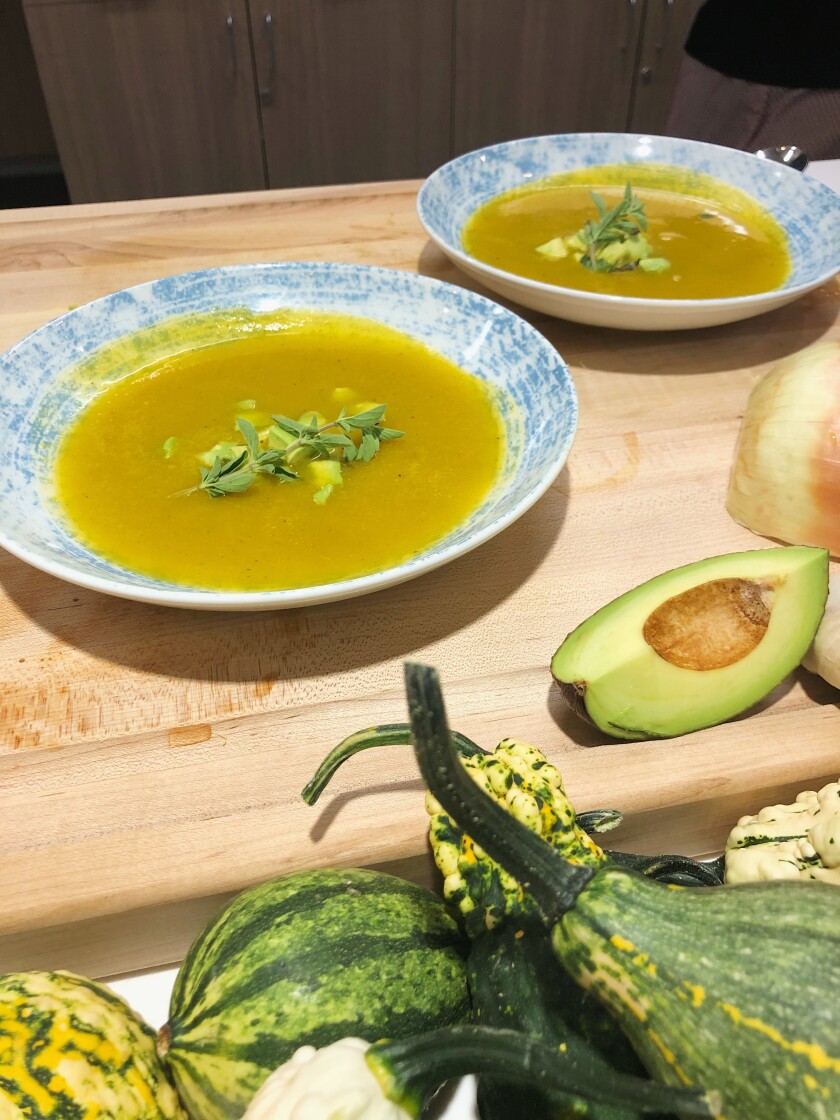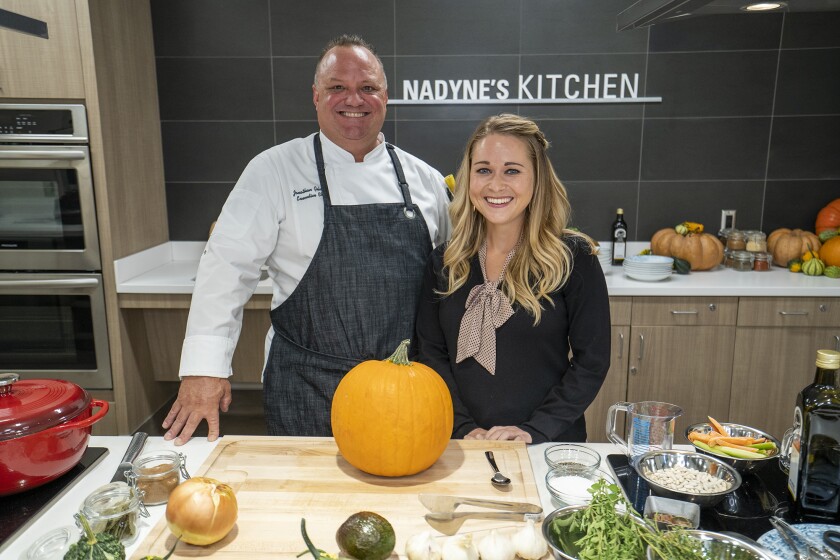Jonathan Gelman, executive chef at Mission Viejo’s Providence Mission Hospital, believes in the power of food.
“It’s kind of our motto,” said Gelman. “It’s all about the healing from within.”
Gelman spent years as corporate chef with exclusive resorts like the Ritz-Carlton. He joined the staff at the hospital a year ago to challenge existing notions surrounding “hospital food.”
“I was brought in to create something healthier, that would present better and give more variety,” Gelman said.
Now he’s teamed up with Kailey Proctor, oncology dietitian at the Leonard Cancer Institute in Mission Viejo, to launch a brand-new cooking series filmed at the Leonard Cancer Institute’s McDermott Family Kitchen. The two aim to make healthy eating easier, especially for patients undergoing cancer treatments.
“I just love working with patients and using food to help manage the side effects from treatment,” said Proctor.
She has worked as dietitian for six years and spent the last two working in patient oncology. In November, she became board certified in oncology nutrition.

Leonard Cancer Institute oncology dietitian Kailey Proctor inside Nadyne’s Kitchen on Tuesday.
(Scott Smeltzer / Staff Photographer)
The Leonard Cancer Institute offers radiation oncology, imaging services and medical oncology. The institute emphasizes the role nutrition plays in the treatment of cancer, as the disease places extra nutritional demands on the body.
The McDermott Family Kitchen — sometimes referred to as Nadyne’s Kitchen for the McDermott family member the kitchen was dedicated to — is where registered dietitians provide patients with nutrition-rich meals that help achieve lasting remissions.
Nadyne’s Kitchen also provides a space for dietitians to provide cooking demonstrations and educational programs, like Gelman and Proctor’s series, that can be live-streamed.
“We often come up for a theme for the episode and then Chef works on some recipes and then I come in and kind of put an oncology spin on it,” said Proctor. “So we focus on symptoms that patients have and help manage that with the recipes.”
The team films a new video each month and most recently put together an episode featuring a “Taste of Fall” menu.
“These recipes that we’re doing are very simple,” says Gelman in the episode. “A butternut squash soup that is very easy and can be frozen in portions for future use. And then we are doing a braised short rib with some cannelloni beans and some Swiss chard. So really healthy, lots of good fiber and lots of good protein.”

A butternut squash soup with some sliced avocado created for the “Taste of Fall” video made at the Leonard Cancer Institute.
(Sarah Mosqueda)
The two blend roasted garlic, onions and butternut squash into a smooth soup that Gelman ladles into a bowl. They talk about what to do if food tastes bland or metallic and how to find ways to increase calories or add protein.
“You could add a spoonful of olive oil, butter or even some sliced avocado to add some heart-healthy fats and about a 100 extra calories to this soup,” Proctor suggests.
“Crab would be good too,” Gelman quips.
“Crab would also add protein,” Proctor adds.
They decide to top the soup with diced avocado before taking a taste.
“This is my favorite part,” Proctor says into the camera.
Proctor said talking about good nutrition habits with patients is effective, but demonstrating good nutrition habits can be even more powerful.
“It is one thing for me to go tell a patient, ‘This is what you should be eating, this is how you do it,’” she said. “But for them to actually see it and how it is prepared and get different ideas or examples of how to cook certain meals, what tools to use, what is going to help benefit them while they are on treatment, is a really great thing.”
Making the recipes manageable and simple is part of their objective as well, Gelman said.
“Part of the focus on every series that we do is the ease of it,” said Gelman. “Being able to do things when you may not have the strength or the stamina to do it. Maybe show some batch cooking, where they can meal-prep a bit for the week and make it as simple as possible.”
Gelman and Proctor have hosted six classes so far, and the filmed episodes can be viewed on the Providence Mission Hospital‘s website and LinkedIn profile.

Providence Mission Hospital Executive Chef Jonathan Gelman, and Leonard Cancer Institute oncology dietitian Kailey Proctor have launched a new cooking series where they teach cancer patients healthy recipes.
(Scott Smeltzer / Staff Photographer)
“We will probably be doing a ‘Taste of Fall Desserts’ next month,” said Gelman, “and eventually when we get through COVID, there will be more live classes.”
Proctor said feedback on the series has been positive, and she’s happy to help patients regain a sense of autonomy through cooking.
“Patients often feel that a lot is out of their control while they are in treatment, and I love that we are focusing on them and what they have control over,” Proctor said. “They can still enjoy food while in treatment.”






